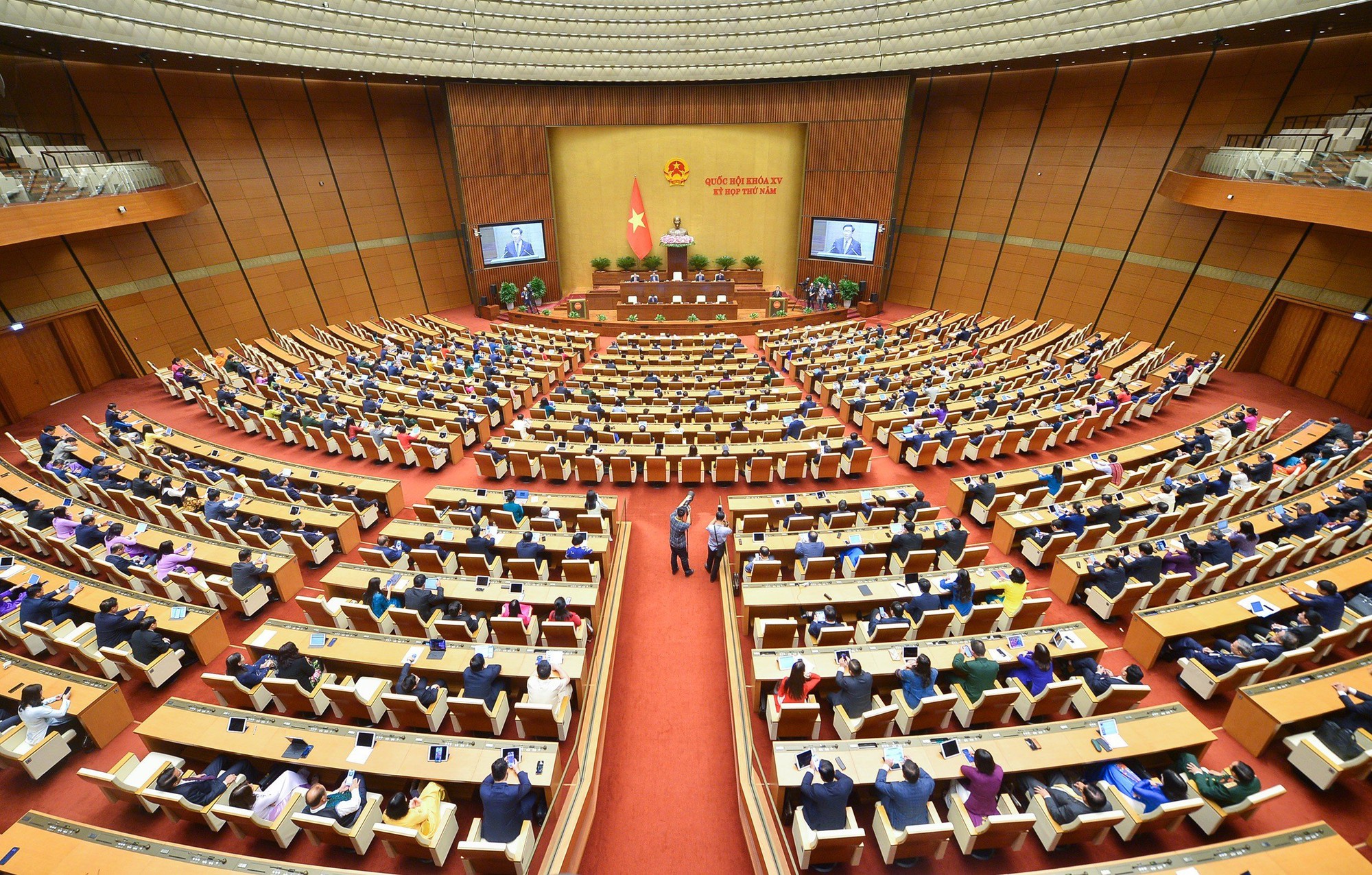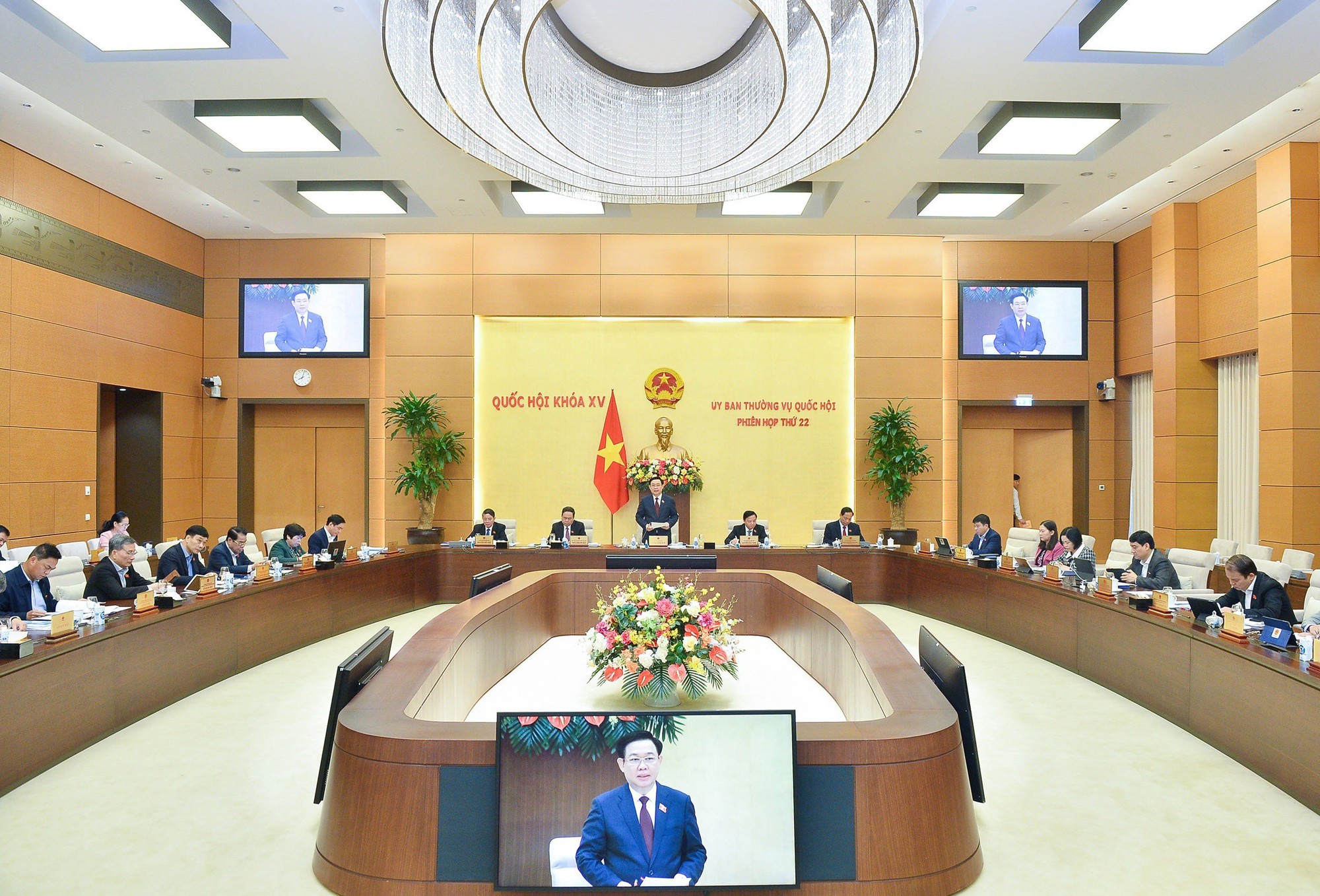The success of the first General Election in January 6th 1946 laid the foundation for the establishment of the National Assembly of Vietnam, a democratic and pillar institution of the Law-governed state of people, by people and of people. For the first time in our history, all citizens aged from 18 years old participated in the late General Election of the Democratic Republic of Vietnam and the Socialist Republic of Vietnam today.

The National Assembly is the highest representation of people; the top power authority of the Socialist Republic of Vietnam. The body has three (03) key functions: (1) Make laws; (2) Make decisions on important issues of the nation; (3) Monitor at the supreme level of all activities of the State.
Specific duties and rights of the body has been stipulated in the Constitution of Vietnam, including:
1. To make and amend the Constitution; make and amend laws;
2. To execute the right of supreme monitor on compliances to the Constitution, laws and resolutions of the National Assembly; to examine of the work of the President of the State, the Standing Committee, the Government, the Supreme Court, the Supreme People’s Procuracy of Vietnam, the National Election Council, the State Audit Office of Vietnam and other agencies formed by the National Assembly.
3. To decide targets, mottos, policies and fundamental duties of socio-economic development of the country.
4. To decide the framework policies on finance, monetary; to regulate, amend and/or abolish taxation; to allocate incomes and spending of the central and local governments budgets; to decide the limit of national debts, public debts, government debts; to decide national budget estimates and the central budget allocations; to approve the State budget statement.
(5) To make decisions on policies on ethnic, religion of the State.
(6) To set regulations and operations of the National Assembly, the President of State, the Government, the People’s Court, the People’s Procuracy, the National Election Council, the State Audit of Vietnam, local governments and other authorities established by the National Assembly.
(7) To vote, dismiss, discharge the role of the President of State, Vice President of State, the Chairman of the National Assembly, Vice Chairmen of the National Assembly, Members of the National Assembly Standing Committee, the Chairperson of the Ethnic Council, Chairpersons of the Committees of the National Assembly, the Prime Minister of Government, the Chief Justice of Supreme People’s Court, the Prosecutor General of People’s Supreme Inspection, the Chairperson of National Election Council, the General Auditor of State, Heads of other agencies established by the National Assembly; to approve proposals of nomination, dismiss and discharge of Vice Prime Ministers, Ministers and cabinets of the Government, the Chief Justice of People’s Supreme Court; approve the name list of members of National Defense and Security Council, National Election Council.
After a general election, the President of State, the Prime Minister of Government and the Chief Justice of People’s Supreme Court must take an oath of allegiance to the nation, people and the Constitution.
(8) To vote for credibility of those who are elected and/or approved by the National Assembly.
(9) To decide to establish, dissolve ministries, relevant agencies of the Government; to set up, dissolve, integrate, divide, adjust geographic borders of provinces and cities which are under control of the central government, the special administrative and economic areas; to establish, abolish other agencies in line with the Constitution and Laws.
(10) To abolish proposals of the President of State, the National Assembly Standing Committee, the Government, the Prime Minister, the Supreme People’s Court, the Supreme People’s Procuracy which contradict to the Constitution, Laws and Resolutions of National Assembly.
(11) To decide the Amnesty
(12) To set rules on titles and ranks in the people’s armed forces, diplomacies and others; to set regulations on medals, honors and badges of the State.
(13) To decide issues related to war and peace; to set regulations on the emergency situation, special methods to secure the national defense and security.
(14) To decide the fundamental policies on foreign affairs; to approve, decide the accession and/or termination of the international treaties related to war, peace, national sovereignty, member status of the Socialist Republic of Vietnam in the international and regional organizations, the international treaties on human rights, the basic rights and obligations of citizens and international treaties which contradict to laws, resolutions of the National Assembly.
(15). To decide the referendum

The National Assembly of Vietnam works on a basis of meetings and decisions are made based on the majority. The effectiveness of the National Assembly operations are ensured by efficiency of meetings, operations of the Standing Committee, the Ethnic Council, the Committees, the Constituencies, the parliamentarians and efficient collaborations with the work of the President of State, the Government, the Supreme People’s Court, the Supreme People’s Procuracy, the Vietnam Fatherland Front and other related agencies and organizations.
The tenure of each National Assembly Legislature lasts five years, starting from the first opening session of the tenure until the first opening session of the next National Assembly meeting. Sixty days before the National Assembly tenure ends, new members of the National Assembly must be elected. In special circumstance, if at least 2/3 of the total number of parliamentarians approve consensually the tenure to be shortened or extended at the request of the Standing Committee. The extension of a tenure will not be exceeded 12 months except for the case of war.
Normally, the National Assembly gather two sittings annually called by the National Assembly Standing Committee. Nevertheless, the Standing Committee have right to demand unconventional meeting session pursuant to their own decision and/or at the request of the President of State, the Prime Minister of the Government and/or at least 1/3 of the total parliamentarians. The meeting sessions are open and some of them are live broadcasted. Representatives of State agencies, social organizations, economic organizations, armed forces, media, citizens and international guests could be invited to attend the open National Assembly meetings.
The National Assembly of Vietnam is presided by the Chairman. Mr. Chairman presides the National Assembly sessions; signs the Constitutional authentication, Laws, Resolutions of the National Assembly; leads the work of the National Assembly Standing Committee; directs foreign affairs activities of the National Assembly; keeps communications with parliamentarians.
The Vice Chairmen provide supports to the Chairman to fulfill duties assigned by the Chairman. The total number of parliamentarians cannot exceed 500 people, including full-time parliamentarians and non-professional parliamentarians. The total number of full-time parliamentarians is around 40% of the total, at least.
The National Assembly Standing Committee is a permanent agency of the National Assembly. The Committee consists of the Chairman of the National Assembly, Vice Chairmen and Members of the Standing Committee in which Mr. Chairman plays the role of the President and Vice Chairmen are vice presidents.
The National Assembly has professional agencies such as the Ethnic Council; 09 Committees (Laws; Justice; Economics; Finance; Budget; Defense and Security; Culture and Education; Society; Science, Technology and Environment; Foreign Affairs).
The National Assembly constituencies combine parliamentarians who were elected in a province or city which are under the central government.
The National Assembly Office provides assistance to the National Assembly, the Standing Committee, the Ethnic Council, Departments of the Standing Committee.
Additionally, the Standing Committee established agencies under its authority with aim to propose and recommend to the Committee on issues, including the Parliamentarians Department, People’s Volunteer Department and Law Making Research Institute.
Today, National Assembly of Vietnam is a member of Inter-Parliamentary Union (IPU), ASEAN Inter-Parliamentary Assembly (AIPA), L'Assemblée parlementaire de la Francophonie (APF), the founding member of Pacific Parliamentary Forum (APPF), Association of Asian Parliaments for Peace (AAPP).
Inherited and carry out beautiful tradition of previous tenures, the National Assembly Legislature XV (2021-2026) led by the Chairman Mr. Vuong Dinh Hue has continued to reform and improve quality and efficiency of operations of the National Assembly for the ultimate goal of serving national interests; for the happiness of people; raise the democracy, unity, rule of law, integrity, openness, transparency, professionalism, ongoing improvements of quality and efficiency of the work of the National Assembly in both law making, supreme monitor and decisions on important matters of the nation.
On the basis of apprehension and institutionalization of the Resolution of the National Party Congress, Legislature XIII, in the first years of the tenure of legislature XV, the National Assembly of Vietnam has constantly improved quality of law making and principles, rule of law making process, built a consistent, uniformed, stable, possible, constitutional and legal complied laws system; and that are in line with the international treaties in which Vietnam is a member with aim to create a comprehensive legal framework for the construction of sustainable development of the country in which people and businesses are centered.
To continue to reform and accelerate the monitor has been seen a key, central factor to enhance effectiveness and efficiency of the work of the National Assembly. Continue to reform approaches, question and answer method, increase the question time at the National Assembly Standing Committee, Presentations at the Ethnic Council and other Committees; monitoring activities carried out by the parliamentarians, constituencies; focus on monitoring laws implementation and execution of proposals in the post monitor, integrated with accountability of related organizations and individuals, especially the top leaders.
To constantly reform operation method and raise quality of decision on important issues of the country in structure and senior personnel of the State; targets, objectives, policies, fundamental duties of socio-economic development, investment policies on national programs and initiatives. To increase quality, efficiency and effectiveness, decision of fundamental policies on finance, national monetary; secure principles, rules, transparency and clearness integrated with accountability in the finance and state budget issues.
To increase the quality of decision on fundamental policies on foreign affairs; to continue to underpin foreign affairs activities of the National Assembly integrated with foreign affairs of the Party, diplomacy of the State and people-to-people diplomacy, contributing to heighten the position of the National Assembly and the national position on the world stage.
To boost digital transformation in the work of the National Assembly. To continue to reform, increase quality and effectiveness of advisers, assistants to the National Assembly agenda; direct, guide and monitor activities of the People’s Councils; to reform and get larger meetings with voters, consult and take feedbacks and keep close communications with voters.
In order to fulfill targets of the tenure, initial statistics show in the first three years of the tenure, legislature XV, 136 official regulatory documents were issued (the National Assembly issued 101 documents, the Standing Committee issued 35 documents); 793 directions were given by the leaders of the National Assembly at Conferences, Fora and Meetings.
During 80-year foundation and development, the National Assembly of Vietnam under the leadership of the Communist Party, affirms the best pool of intellectuals, stances, power of great unity of country, illustration of willingness, desires of voters, accompanying with the nation in any revolutionary period of time, successfully fulfil its missions and the assigned duties./.